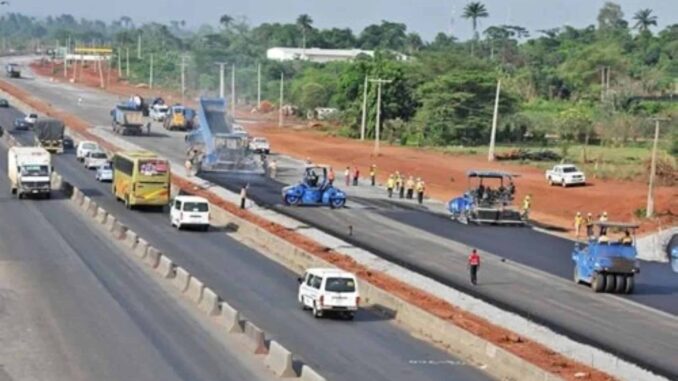
FOLLOWING public outcry over the chaotic traffic situation on the Lagos-Ibadan expressway, the Federal Government, yesterday, suspended further work on the ongoing reconstruction.
The Federal Controller of Works in Lagos, Mrs Olukorede Kesha, in a statement, said the suspension was to reduce possible gridlock during the Eid-el-Kabir celebration slated for Wednesday and Thursday.
The statement reads: “Due to the recent heavy traffic flow being experienced on the Lagos-Shagamu route in the last couple of days, the inclement weather conditions, the forthcoming Eid Kabir and the advice of the traffic management team deployed to manage traffic-related issues on the project.
“Construction activities on this ever busy and very important highway will be suspended from Tuesday, 27 of June to Sunday,2 of July 2023.
“This is to allow travellers easy passage during the Eid holiday and minimise the discomfort of traffic gridlock during this very important period.
“Travelers are advised to cooperate with Traffic Management Team deployed on the highway to manage traffic.”
Project has gulped over N315bn so far
The 127-kilometre Lagos-Ibadan Expressway is Nigeria’s oldest road that was commissioned in 1978 by the military government of Olusegun Obasanjo.
The contract for its reconstruction was awarded in 2013 by the Goodluck Jonathan administration at N315 billion.
So far, the Federal Government has approved about N240 billion for the reconstruction of the Lagos-Ibadan Expressway, out of a total of N315 billion which is the project’s contract value.
The highway, on which work has stalled over time, connects Lagos, Ogun and Oyo states, and it leads to various regions of the country.
The Federal Government had initially made a concession agreement with Wale Babalakin’s Bi-Courtney to rebuild and manage the road for 25 years, but after the company failed to make any progress, the Federal Government, on November 19, 2012, terminated the contract.
As a result, former President Goodluck Jonathan’s administration, in July 2013, flagged off the reconstruction of the highway and awarded the project to Julius Berger Nigeria and Reynolds Construction Company Nigeria at a cost of N167 billion with a completion period of four years.
Sections completed
The sections of the expressway being reconstructed are section I (Lagos to Sagamu Interchange) and section II (Sagamu Interchange to Ibadan).
At the initial concession agreement, Bi-Courtney was expected to expand the lanes from Lagos to Sagamu to 10 and six lanes from Sagamu to Ibadan. It was also expected to build trailer parks and five interchanges among others.
The project, which started in 2013, had 2017 as the initial completion date but was later shifted to the end of 2018 and early 2019.
However, the completion period was further shifted to 2021 and in meeting up with the new deadline, the Federal Government granted Julius Berger’s request to close the Berger-Kara section of the road for reconstruction.
In 2018, the Federal Executive Council, FEC, approved over N64 billion for additional work to be carried out on Section I of the Lagos-Sagamu interchange of the expressway project.
The council approved the sum to cover over 43.6 kilometres, which include pedestrian bridges and toll plazas for the section, to accommodate the changing nature of the road.
Expert blame FG for unnecessary delay
Reacting to the delay in the reconstruction, some experts in the transportation sector blamed the Federal Government for unnecessary delay and lack of effective transport management strategy which has resulted in untold hardship on citizens.
Mr Kayode Opeifa, a former Commissioner for Transportation in Lagos State, said: “Nigerians have gone through a lot over the unending reconstruction of Lagos-Ibadan Expressway, due to improper management by the federal government.
“The fundamental problem why people are still suffering along the axis is simply because the Federal Government and its contractor, Julius Berger Plc, failed to carry along the local interests, which include the state governments, both Lagos and Ogun, residents’ association, transport unions and other relevant stakeholders.